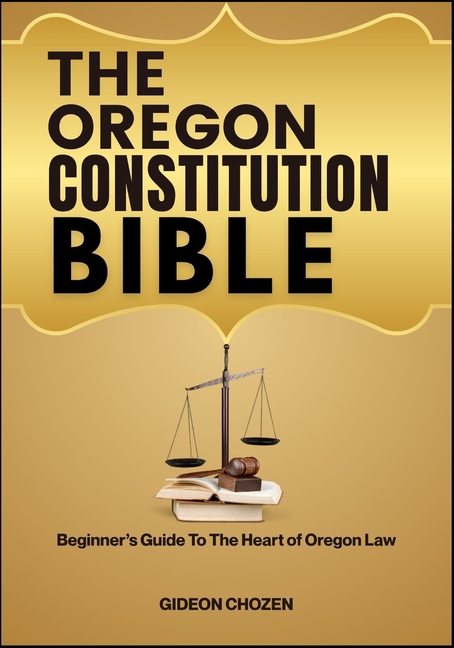Description
The Constitution of Oregon stands as the foundational legal document that defines the structure, powers, and functions of government within the state of Oregon. As the supreme law of the state, it establishes the framework within which Oregon's government operates and guarantees the rights and freedoms of its citizens. Rooted deeply in the principles of democracy, justice, and individual liberty, the Oregon Constitution reflects the values, aspirations, and unique history of the people of Oregon.
The journey to the creation of Oregon's Constitution is intertwined with the broader narrative of American expansion and settlement in the Pacific Northwest during the mid-19th century. Oregon's early settlers sought to form a government that would provide order and stability in a vast and often rugged territory, ensuring the protection of property rights, the maintenance of law and order, and the promotion of the common welfare. This desire culminated in the drafting and adoption of the Oregon Constitution in 1857, a pivotal moment that paved the way for Oregon's admission into the United States as the 33rd state in 1859.
What distinguishes the Oregon Constitution is not only its role as a legal charter but also its embodiment of progressive ideals and responsiveness to the needs of its residents. From its provisions on education, suffrage, and public welfare to its detailed articulation of the powers of the legislative, executive, and judicial branches, the document is crafted to balance authority and accountability. It establishes a government designed to serve its people with fairness, transparency, and efficiency.
Moreover, the Oregon Constitution has evolved over time through amendments and judicial interpretation, adapting to the changing social, economic, and political landscape. This adaptability ensures that the constitution remains a living document-one that continues to protect the rights of individuals while promoting the public interest. Its provisions have addressed complex issues such as environmental stewardship, labor rights, and civil liberties, reflecting Oregon's pioneering spirit and commitment to progressive governance.
Understanding the Constitution of Oregon is essential to appreciating the state's legal identity and democratic traditions. It provides not only the legal basis for government action but also a moral compass guiding public policy and civic life. Whether in times of peace or challenge, the Constitution serves as the bedrock upon which Oregonans rely to protect their freedoms, resolve disputes, and pursue collective progress.
The Constitution of Oregon is more than a document of law; it is a testament to the enduring values of democracy, justice, and community that continue to shape the state. As Oregon moves forward, its Constitution remains a vital instrument ensuring that government remains of the people, by the people, and for the people.
The journey to the creation of Oregon's Constitution is intertwined with the broader narrative of American expansion and settlement in the Pacific Northwest during the mid-19th century. Oregon's early settlers sought to form a government that would provide order and stability in a vast and often rugged territory, ensuring the protection of property rights, the maintenance of law and order, and the promotion of the common welfare. This desire culminated in the drafting and adoption of the Oregon Constitution in 1857, a pivotal moment that paved the way for Oregon's admission into the United States as the 33rd state in 1859.
What distinguishes the Oregon Constitution is not only its role as a legal charter but also its embodiment of progressive ideals and responsiveness to the needs of its residents. From its provisions on education, suffrage, and public welfare to its detailed articulation of the powers of the legislative, executive, and judicial branches, the document is crafted to balance authority and accountability. It establishes a government designed to serve its people with fairness, transparency, and efficiency.
Moreover, the Oregon Constitution has evolved over time through amendments and judicial interpretation, adapting to the changing social, economic, and political landscape. This adaptability ensures that the constitution remains a living document-one that continues to protect the rights of individuals while promoting the public interest. Its provisions have addressed complex issues such as environmental stewardship, labor rights, and civil liberties, reflecting Oregon's pioneering spirit and commitment to progressive governance.
Understanding the Constitution of Oregon is essential to appreciating the state's legal identity and democratic traditions. It provides not only the legal basis for government action but also a moral compass guiding public policy and civic life. Whether in times of peace or challenge, the Constitution serves as the bedrock upon which Oregonans rely to protect their freedoms, resolve disputes, and pursue collective progress.
The Constitution of Oregon is more than a document of law; it is a testament to the enduring values of democracy, justice, and community that continue to shape the state. As Oregon moves forward, its Constitution remains a vital instrument ensuring that government remains of the people, by the people, and for the people.
Last updated on
Product Details
- Jun 22, 2025 Pub Date:
- 9798289220080 ISBN-10:
- 9798289220080 ISBN-13:
- English Language




